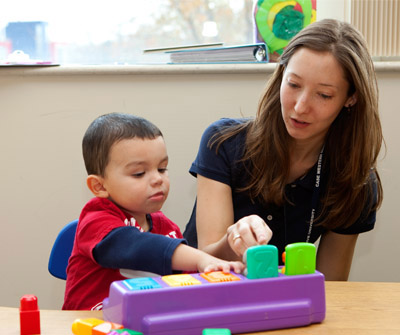Hearing loss generally happens gradually over a long period of time. Often, the subtle, and not so subtle, signs of hearing difficulty are more apparent to significant partners than it is to the person with the hearing loss.
8 Ways to Encourage a Loved One to Have A Hearing Test
Tags: Hearing Aid, Hearing Aids, Hearing, Support, Caregiving, Hearing Loss, "ears"
Signs and Symptoms of Concussion in Children
A concussion is a mild form of Traumatic Brain Injury (TBI) caused by a bump, blow, or jolt to the head. Concussions can also occur from a fall or a blow to the body that causes the head to move rapidly back and forth.
It is a common opinion that concussions happen mostly to football players. However, they can also occur while playing other contact sports such as soccer, as a result of a vehicular accident, or during a fall.
Tags: Teens, Support, Brain Injury, toddler
What is Aphasia?
Aphasia is a language disorder resulting from an injury to the brain, such as a stroke or head trauma. Aphasia involves varying degrees of communication difficulties in these areas:
Spoken Language Comprehension - otherwise known as “Receptive Language” or “Auditory Comprehension.”
Symptoms may include:
Tags: Speech, Language, Communication, Support, Stroke, Brain Injury, talking
5 Toys = 5 Ways to Improve Speech Development
Playing with your child is a essential way to improve his/her speech, language, and social skills! Below are five different toys and ways to play with your child to encourage language growth and development:
Mr./Mrs. Potato Head:
- Following Directions: Ask your child to give you various parts. If this is too simple, ask him/her in a more complex way. For example, instead of asking for Mr./Mrs. Potato Head's shoes, say "the ones you put on your feet.” Sometimes this works best after the child has built Mr./Mrs. Potato Head and is asked to follow the directions of placing each part back into the box.
Tags: Speech, Language, Communication, Support, Learning, Voice, toddler, talking
May is Better Hearing & Speech Month
Did you know…
- An estimated 40 million Americans experience speech, language, and/or hearing disorders.
- The second most common reason for special education services in public schools is speech/language impairment.
- 36 million American adults report so
Tags: Speech, Hearing Aid, Audiology, Language, Hearing Aids, Communication, Hearing, reading, literacy, Hearing Loss Prevention, Teens, Support, Caregiving, Hearing Loss, Stuttering, Learning, Voice, toddler, talking, Autism
Extra Help at Home for Your Child with Speech-Language Issues
Children who have been identified with speech-language impairments have likely established nonstandard patterns of speaking or have deficits that will require extra attention and training to improve. The speech-language pathologist (SLP) working with you and your child should serve as a "coach" to provide you with activities or homework to reinforce newly established skills and to strengthen emerging skills. One or two sessions a week is not enough, and your involvement in carryover activities is crucial to your child's communication development. Talk with your SLP about activities and games you can use at home to help.
Tags: Speech, reading, literacy, Teens, Support, Learning, Voice, toddler, talking
Earbuds, Music and Your Teen
Today, with the popularity of earbuds and other personal listening devices, it’s hard to know if your child or teenager is listening to music at a safe level. Back in the day, when stereo speakers were common, it was easier for parents to know how loud their children were playing music.
Tags: Audiology, Hearing, Teens, Support, Hearing Loss, "tinnitus"
10 Tips for Working with an Interpreter
If you’ve never worked with a Sign Language interpreter before, you may not be aware of how to prepare for and conduct yourself during this interaction. Don’t worry – below are several guidelines that will help make a positive experience for you, the interpreter, and most importantly, the Deaf or Hard of Hearing (HoH) individual.
Tags: Communication, Support, Deaf, Hard of Hearing, American Sign Language, Interpreting, ASL Interpreter, ASL
Access to Services is Crucial for Deaf and Hard of Hearing
The loss of the ability to communicate can mean a loss of quality of life, especially for those who are Deaf and Hard of Hearing (HoH). The Americans with Disabilities Act (ADA) protects the civil rights of all Americans, regardless of ability, by requiring businesses and organizations to offer reasonable accommodations that allow for effective communication. For Deaf/HoH people, this could mean anything from captioning, texting, video relay services, or sign language interpreting services, dependent on the individual. The vision of Cleveland Hearing & Speech Center (CHSC) is a community where everyone communicates effectively.
Tags: Communication, Support, Deaf, Hard of Hearing, American Sign Language, Interpreting, ASL Interpreter, ASL
Should My Child Learn a Second Language?
Introducing your child to multiple languages at a young age is a personal decision that can be challenging for many families. Children who become fluent in one language are referred to as “monolingual,” and children who become fluent in two languages are referred to as “bilingual.” Speaking a language at home that is different than what your child may be exposed to at school and in the community can spark several questions such as “Will it be difficult for my child to learn another language?” “When should I start to teach my child two languages?” “How can I help my child learn a second language if I don’t know it myself?”



















